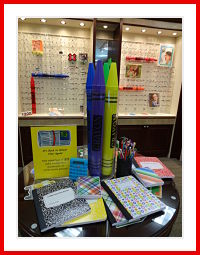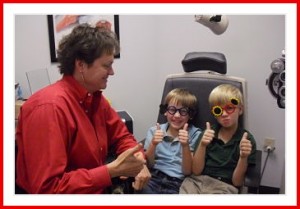 Does Your Child Have the Right Vision Skills for School?
Does Your Child Have the Right Vision Skills for School?
 As we prepare to organize the supplies and tools needed for a successful school year, most parents are thinking of paper, pencils, rulers and supplies. Let’s look at the visual tools needed for a successful academic year!
As we prepare to organize the supplies and tools needed for a successful school year, most parents are thinking of paper, pencils, rulers and supplies. Let’s look at the visual tools needed for a successful academic year!
20/20 Sight But A Poor Reader
Although 20/20 is considered normal eye sight, it just means you are able to see the smallest letters necessary from a distance of 20 feet. This is ONLY the first tool in the visual Tool Box!
We absolutely need to see clearly to begin to interpret the world around us. Some of the symptoms of poor eyesight are blurred sight, headaches, and squinting to see. This can be measured as early as toddler age! You do not have to be school age to have an eye doctor check this.
Most eye doctors can get an estimate of the eyesight measure using pictures or shapes of various sizes and distances from the child. It is more important that the eyesight is developing normally in each eye than the exact number of sight at that early age.
The American Optometric Association recommends a complete vision exam by a qualified eye doctor at the critical ages of development where intervention can be most successful. Those age levels are from 6 months to 1 year, again at 3 years of age, and then before beginning school.
How do you examine an infant?? They cannot talk yet! Many optometrists are involved in the infantSee program which entails a complete eye exam for all children 6-12 months of age. This age is important to rule out any disease or developmental disorder that could lead to poor visual skills and eyesight throughout life.
Early Intervention is KEY!
 Pediatricians are able to look at the infant or toddler’s eyes, but they are not trained to examine the visual pathway. Do you trust your pediatrician to examine your child’s teeth? Of course not, you go to the pediatric dentist to get a thorough evaluation by the specialist in that area. The same is true for pediatric vision examinations – find a specialist!
Pediatricians are able to look at the infant or toddler’s eyes, but they are not trained to examine the visual pathway. Do you trust your pediatrician to examine your child’s teeth? Of course not, you go to the pediatric dentist to get a thorough evaluation by the specialist in that area. The same is true for pediatric vision examinations – find a specialist!
The earlier problems or delays are detected, the easier it is to treat or find a remedy. Once the child’s needs are identified and addressed, the challenges that could have made learning more difficult can already be addressed.
Vision Skills Needed For School
- Orientation: Students with orientation problems have difficulty sitting still, finishing tasks, concentrating, easily distractible. This is often observed as motor overflow (unwanted excessive movement) including wiggling, hand and body movement, and excessive talking. They also have difficulty with near to far tasks like copying from the board.
- Tracking and Locating: Involves the abilities to look where you want to, sustain looking for as long as you need to, move your eyes to track a moving object, find or locate another target in our view, and to aim and center our eyes together at one location. You can certainly see how important these skills are for us to understand and perceive our world as it is. Especially with reading and moving our eyes to see the words in the right order.
Poor tracking development may appear as inability to catch a ball, loss of place when reading, rereading the same line or skipping lines. The control of eye movements plays a huge role in the quality of a person’s attention and awareness. - Focusing or Accommodation: the adjustment of the focus of the eyes for different distances so we can see clearly. Did you know when you focus your eyes for far away, you cannot see clearly up close? Try it. For focusing to work well, we need the ability to accurately focus for the correct distance, quickly shift focus to various distances, and sustain the correct focus for as long as the task requires. This plays a huge role in visual attention, often mislabeled as attention deficit disorder.
Difficulty with focusing skills may be described as blurry or “gleary”, smeared, or slow copying from the board, or a reduced reading or writing distance. We call that “sniffing the paper.” - Eye Teaming: the ability to use both eyes together and align both eyes to give the brain the same information.
Eye teaming or binocular vision problems are difficulty in coordination of the two eyes. The eyes may look misaligned ( one eye deviated inward toward the nose, or outward past the straight ahead position, or one eye higher than the other). Sometimes the deviation only occurs at near, so you as an observer would not see it if you sit by your child when they are doing reading or writing tasks. Sometimes the person will cover one eye to rid themselves of double images( double vision).
There Are Many More Visual Skills Needed!
So that you can become aware of these skills and be a great detective parent or grandparent, I will be discussing how you can look for signs that “something’s just not quite right.” All too often I hear from a 3rd or 4th grader’s parent: “Oh, if I had only known about this sooner.”
The purpose of this blog is to empower and educate all that are involved in the development of children about the critical link between learning and vision.
A learning-disabled child grows up to be a learning-disabled adult.
The following is an excerpt from the proclamation from the State of North Carolina, proclaiming August as “Children’s Vision and Learning Month.”:
WHEREAS, according to the College of Optometrists in Vision Development, vision disorders are the number one handicapping condition of children: in fact, as many as one in four school age children have vision problems that could interfere with learning; and
WHEREAS, sixty percent of students identified as “problem learners” have undetected vision problems and 18 million children will not have an eye exam by an eye doctor by the time they enter school; and
WHEREAS, public awareness about learning-related vision problems is necessary to ensure that young people recive the prompt vision treatment they need to enhance their lives; and
WHEREAS, parents, educators, school nurses and all concerned adults should recognize the critical role good vision plays in the learning process and should work together to help prevent or reduce the impact untreated vision problems can have on our children’s ability to read and learn.
Stay tuned for information about how to find a doctor of optometry that can help you with your child’s vision development.
